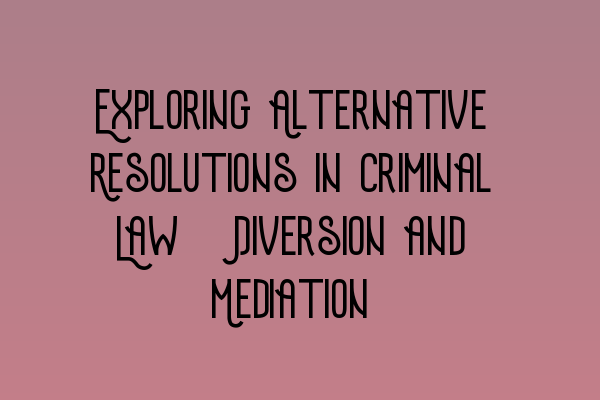Exploring Alternative Resolutions in Criminal Law: Diversion and Mediation
When it comes to the criminal justice system, traditional methods of resolution, such as trial and punishment, may not always be the most effective or appropriate course of action. In recent years, there has been a growing recognition of the value of alternative resolutions in criminal law, namely diversion and mediation. These approaches offer a more collaborative and rehabilitative approach to justice, focusing on resolving conflicts and addressing the underlying causes of criminal behavior. In this article, we will explore the concept of diversion and mediation in criminal law and discuss their benefits and limitations.
1. Understanding Diversion in Criminal Law
Diversion refers to the process of diverting certain offenders away from the traditional criminal justice system and towards alternative programs or interventions. This approach acknowledges that not all offenders need to be subjected to the full force of the criminal justice system and that there may be more effective ways to address their underlying issues.
Diversion programs often involve counseling, therapy, substance abuse treatment, or community service, depending on the nature of the offense and the needs of the offender. The goal is to intervene early and provide individuals with the support and resources they need to address their behavior and prevent reoffending.
Diversion can take various forms, such as deferred prosecution agreements, restorative justice programs, or specialized courts like drug courts or mental health courts. These programs aim to divert offenders out of the traditional court process, focusing on rehabilitation and restorative justice principles instead of punishment.
When implemented effectively, diversion can have numerous benefits. It can reduce overcrowding in prisons, save costs for the criminal justice system, and offer individuals a chance to address their underlying issues and change their behavior. Additionally, diversion programs may also benefit victims, as they provide opportunities for offender accountability and restitution.
The Role of Mediation in Criminal Law
In addition to diversion, mediation plays a crucial role in alternative resolutions within criminal law. Mediation involves bringing together the victim, offender, and a neutral third party to facilitate communication and negotiation. The aim is to reach a mutually acceptable agreement that addresses the harm caused by the offense and promotes healing on all sides.
Mediation allows victims to have a voice in the justice process and actively participate in creating a resolution that meets their needs and desires. By engaging in dialogue with the offender, victims can express their emotions, seek answers to their questions, and, in some cases, receive compensation or restitution.
For offenders, mediation provides an opportunity to take responsibility for their actions, understand the impact of their behavior, and work towards repairing the harm they have caused. It can also foster empathy and promote a better understanding of the consequences of criminal behavior.
Mediation differs from traditional criminal proceedings as it focuses on repairing the harm rather than solely punishing the offender. It encourages dialogue, understanding, and collaboration between the parties involved, with the aim of achieving a resolution that encourages learning, growth, and restoration.
The Benefits and Limitations of Alternative Resolutions
Alternative resolutions, such as diversion and mediation, offer significant advantages over traditional criminal justice approaches. These alternative methods can promote rehabilitation, restore relationships, provide closure for victims, and offer a more personalized and impactful response to criminal behavior.
However, it is essential to recognize that alternative resolutions are not suitable for all cases. Serious offenses or cases involving power imbalances may require more formal legal processes. Additionally, alternative resolutions heavily rely on the willingness and cooperation of both the offender and victim. If either party refuses to participate, the process may not be viable.
It is crucial for legal professionals to assess each case individually, considering factors such as the severity of the offense, the needs of the victim, and the potential for an alternative resolution to be successful. Legal practitioners should be well-versed in the intricacies of diversion and mediation, including the relevant laws, procedures, and best practices surrounding these alternative approaches.
At SQE Criminal Law & Practice Law UK, we offer comprehensive preparation courses for aspiring solicitors, ensuring they are equipped with the necessary knowledge and skills to effectively navigate alternative resolutions, diversion, and mediation within the criminal justice system. Visit our website to learn more about our SQE 1 Preparation Courses or SQE 2 Preparation Courses.
Conclusion
Exploring alternative resolutions in criminal law, such as diversion and mediation, has become increasingly essential in promoting a more rehabilitative and restorative approach to justice. These approaches offer numerous benefits, including reduced recidivism rates, cost savings, and increased victim satisfaction.
However, it is important to recognize the limitations of these alternative resolutions and to apply them appropriately within the context of each case. Legal professionals must have a deep understanding of diversion and mediation, ensuring they can advocate effectively for their clients and help facilitate meaningful resolutions.
By embracing alternative resolutions and incorporating them into our criminal justice system, we can work towards a more compassionate, inclusive, and effective approach to justice.
